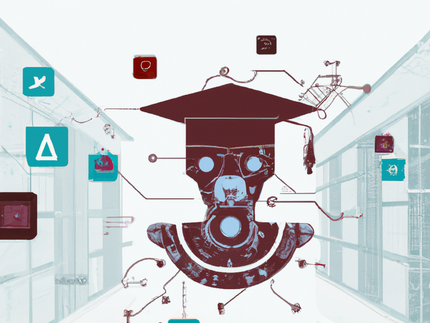ChatGPT and Co. in higher education
Since the ChatGPT service was released for individual use in November 2022, the academic world has been in an uproar. ChatGPT is an assistant that can answer questions and queries in different languages and provide information based on a large language model. On this topic page we offer a collection of articles and further links on the topic of AI and E-Assessment and higher education teaching.
Please note:
Currently, only use of ChatGPT based on private choice is possible. This means that employees cannot be instructed or asked to use ChatGPT and students cannot be obliged or asked to use ChatGPT unless technical and organisational measures can be taken to ensure that their personal data, including names, email addresses and IP addresses, cannot be processed when used by OpenAI.
[28.04.2023]
What is ChatGPT?
AI language models such as ChatGPT ("Generative Pre-trained Transformer") are neural networks that have been trained to generate texts. They are trained through extensive training with large amounts of text corpora to determine statistical probabilities for the occurrence of words within certain contexts. ChatGPT is a text-based chatbot that can interact with humans and is trained to produce as natural speech as possible. Based on "prompts", i.e. requests and questions to the AI, ChatGPT generates answers and takes the context of the chat history into account.
What is ChatGPT capable of?
Both teachers and students can benefit from the possibilities of ChatGPT. The functions of the AI include:
- Suggested tasks for tests and own knowledge quizzes for students: "Suggest five tasks for me on the following text"
- Draft feedbacks: "Assess the correctness and completeness of the answer (enter answer first) to the following exam question", "Examine the text, paying particular attention to...".
- Create Outlines: "What could an outline for a presentation on topic xy look like?"
- Summarise and simplify texts: "What are the main messages of this text?"
- Writing Python or HTML: "Write the HTML source code for a web page in 2-column design."
- ...
A comprehensive documentation of possible prompts in ChatGPT can be found here: Alan D. Thompson: The ChatGPT Prompt Book
What are the limitations of ChatGPT?
- ChatGPT may use outdated or non-scientific sources, which may result in incomplete or incorrect information. There is also a possibility that relevant scientific studies that are not freely available are not taken into account.
- ChatGPT can generate misinformation, especially in relation to scientific concepts. This can lead to misconceptions among students, especially when it comes to nuanced distinctions that are not easy to understand.
- It is unclear whether ChatGPT may be infringing copyright by accessing and using protected materials in its texts.
How can ChatGPT affect E-Assessments?
ChatGPT could be used by students to cheat on exams such as assignments or take-home exams. Online distance exams could potentially also be solved by students using ChatGPT. It is therefore necessary that you create e-assessments in light of new developments in AI tools and adapt them as necessary. The following can help with this:
- Test your own exam questions: Can ChatGPT solve the tasks? If yes: How can the task be adjusted so that it cannot be answered by AI?
- Adaptation of the examination formats:
- Process orientation (asking for intermediate steps and prompts, e-portfolios)
- Evaluation of images, graphics, statistics; drag and drop assessment
ChatGPT and Teaching
In order for students to use the tool responsibly and beneficially, it is advisable for teachers to talk to students about ChatGPT and other AI tools and make them aware of the possibilities and limitations. Students should be informed about the following aspects:
- How ChatGPT works: Students should understand how the AI works, where the data comes from and be aware of the possibilities and limitations.
- Use of ChatGPT in line with academic integrity: It is advisable to discuss with students academic standards such as objectivity and reference in the context of ChatGPT.
- Privacy: Students should understand how their data is collected, stored and used when using ChatGPT.
- Rules for using AI to take an exam: At the beginning of the course, teachers should make it transparent to what extent students are allowed to use AI during the course and, if applicable, for the exam. One example is the „Rules for Tools“ by Prof. Dr. Christian Spannagel.
Assistance for teachers
Get suggestions for the course design
Create individualised material
Use existing content for new material formats
Using existing materials to create new formats
Create standardised text
Source: Übersicht zu ChatGPT im Kontext HochschulLehre (Hamburger Zentrum für Universitäres Lehren und Lernen (HUL))
Further AI Tools for teaching and learning
- Elicit | Research Tool
- Consensus | Research Tool
- Litmaps | Research Tool
- Explainpaper | Text comprehension
- SciSpace | Text comprehension
- Alpa | Text production
- Neuroflash | Text production
- AI Collection | Collection of AI-Tools
Further information
- dghd-Themenreihe: KI in der Hochschullehre
- Dossier: Generative KI (Hochschulforum Digitalisierung)
- Rules for Tools (Prof. Dr. Christian Spannagel | PH Heidelberg)
- https://digiethics.org/2023/01/03/warum-chatgpt-nicht-das-ende-des-akademischen-schreibens-bedeutet/Warum ChatGPT nicht das Ende des akademischen Schreibens bedeutet (Martin Dademacher | Hochschulforum Digitalisierung)
- Fakten, Fakes und Fiktion: Die wahre Herausforderung nach Corona (Prof. Dr. Weßels | FH Kiel)
- ChatGPT – ein Meilenstein der KI-Entwicklung (aus: Forschung und Lehre, 20.12.2022)
- ChatGPT: five priorities for research (Eva A. M. van Dis, Johan Bollen, Willem Zuidema, Robert van Rooij & Claudi L. Bockting)
- Übersicht zu ChatGPT im Kontext Hochschullehre (Hamburger Zentrum für universitäres Lehren und Lernen)

